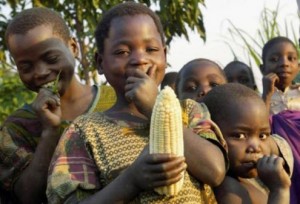The problem with Malawi’s state-subsidized maize surplus: Nutrition
Published on June 5, 2012 at 4:06 AM by FACE OF MALAWI
Malawi is fixated on maize, but Kristof and Stacia Nordin aim to change that. They say native crops would bring variety and abundance to the monotonous Malawian diet.

In response to the 2005 food crisis, which left five million Malawians in need of emergency food aid, President Bingu wa Mutharika promoted the distribution of millions of coupons for fertilizer and maize seeds to small-scale farmers.
Malawi’s seed subsidies, which take up 16 percent of the national government’s budget, have greatly lowered starvation rates.
However, maize, which is not a native African plant, has become such an integral part of society that it now consumes the land, diet and economy of Malawi.
That’s why Kristof and Stacia Nordin are working to re-envision how Malawians think about food. They promote the practice of permaculture through their organization, Never Ending Food, which offers workshops for Malawian farmers on natural principles that don’t involve fertilizers or chemicals.
The Nordins’ own garden is an example of the potential bounty that permaculture can provide: they harvest cassava, yam, sweet potato, avocado, passion fruit, and other local fruits, beans and berries.
“In a tropical climate we should be planting tropical plants,” said Kristof Nordin, speaking about the Malawian government’s decision to subsidize maize. “There are so many indigenous crops that have been growing here for thousands of years and have naturally adapted to this climate and its diseases, such as millet and sorghum. For thousands of years Malawians have survived without the World Food Programme.”
Though the initiative was intended to lower poverty levels, it imposed a reliance on maize for farmers. In addition, the government-sponsored subsidies are a drain on public resources. Planting only maize requires a lot of human energy for tilling every year, money for seed, fertilizer, pesticides, and adequate amounts of rain.
Taking that same acre of land and planting some maize, other grains, root crops, legumes, vegetables, oil seeds and some permanent food trees and plants, creates a system that can withstand various types of weather and insects and supplies a diet high in nutrients for the Malawian people.

